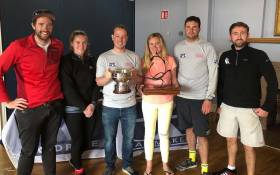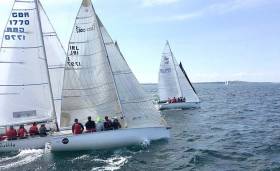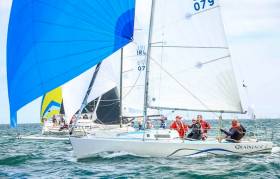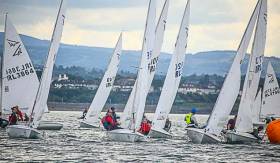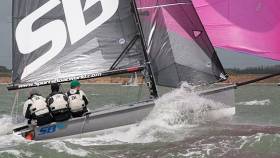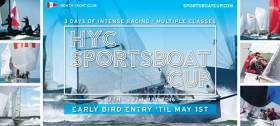Displaying items by tag: Sportsboat Cup
The Royal Irish Yacht Club hosted four-class Dun Laoghaire Cup for sports boats with racing for 1720, SB20, J80 and Beneteau First 21 classes got off to a slow start on Saturday due to unstable winds on Dublin Bay.
In a fine turnout of nearly 50 boats, just one race was possible in each class with RIYC Sailing Manager Mark McGibney telling Afloat: "Fickle and unstable wind direction led to a very frustrating day for the race management team".
The 1720 East Coast Championship, the J80 East Coast Championship and First 21 National Championship are all being staged as part of the Cup.
For the SB20s, in an 11-boat fleet, it is the first opportunity to 'cross swords' in what promises to be a very exciting season in the build-up to September's class World Championships being staged at the same venue. Michael O'Connor leads from Niall O'Riordan. Tadhg Donnelly is third.
In the 21-boat 1720 class, Howth's Robert Dix leads from Rory Lynch. Third is Robert O'Connell.
The 11-boat B21s who are racing under both scratch and ECHO are led (on scratch) by Peter Carroll with Jimmy Fischer second and Hugh Kelly third.
In a five boat J80 fleet, 1 GBR 605 Vincent Lattimore leads Declan Curtin. Royal St George's Mark Nolan lies third.
Racing continues on Sunday with the prospect of more breeze. Results are here
As regular readers of Afloat will know, Ireland's only dedicated sportsboat regatta was postponed in 2021 due to COVID.
Dun Laoghaire Sportsboat Cup Postponed Til 2022
The Royal Irish Yacht Club at Dun Laoghaire Habour has announced it is 'sadly' postponing its planned May Dun Laoghaire Cup till 2022 due to the ongoing COVID-19 restrictions.
Regatta organiser David Ryan told Afloat 'We thank the sailors for their continued support and look forward to seeing everyone in 2022".
As Afloat.ie reported earlier, after getting the full complement of nine races in Aoife and Robbie English's Atara helmed by Ross McDonald won the 1720 Europeans at Howth Yacht Club. They kept their form from the autumn where they won last years National championship in Baltimore to hold the two major trophies for the 1720 Class. With the event on home waters, it was up to them to set the pace of the regatta which they did by winning the first race on Friday. With the sun shining the fleet headed out north of Ireland's Eye in about twenty knots of wind and blistering sunshine, if the water was warmer it would have been shorts and t-shirt weather and lots of sun cream.
There were expectations of blasting downwinds and spray of water that would make for great photographs and thrills and spills during the racing. But by the time midday came and it was time for racing the wind had eased a little so that the downwinds were less white-knuckle blasting and the adrenaline could stop coursing through the bodies. At times it paid to go bow up and stretch the legs but the extra ground covered was not always beneficial. Some experienced skippers were showing great discipline by sticking with the lower displacement mode and making gains when it was easily tempting to bring the bow up, move the crew back and blast from corner to corner. There were huge gains to be made from changing the mode at the correct time depending on the pressure.
"Some experienced skippers were showing great discipline by sticking with the lower displacement mode"
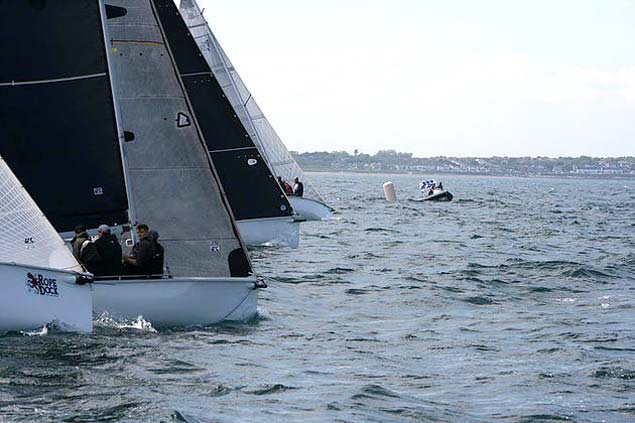 A 1720 race start at the Sportsboat Cup
A 1720 race start at the Sportsboat Cup
The competitiveness of the fleet was shining through as there was a new race winner for nearly every race! It took until race five on Saturday for Atara to be the first boat to win a second race and there were five different race winners in the series. It was Colin Byrne at the helm of Optique who held the overnight lead after day one after posting a race win, a second and fourth. The leaderboard was tight with two O'Leary boats Dutch Gold, Robert, and Antix, Fionn Lyden subbing for Anthony just one and two points adrift. With Antix dominating the final race with a sizeable victory it looked like they had hit their straps.
"The conditions had been perfect, even described as too perfect as the wind barely shifted at all"
The conditions had been perfect, even described as too perfect as the wind barely shifted at all during the racing making it difficult to regain lost ground and placing a premium on starting, boat speed and boat handling. As the crews arrived back on the marina they were greeted by a wheelbarrow of cold beer so their minds could begin to unwind, reflect on an impressive days racing and enjoy the evening sun.
There was a lot to play for on Saturday with four races scheduled after another midday start with the wind in the mid-teens and forecast to drop as the day progressed. Saturday again brought lots of sunshine and glamorous conditions albeit this time with a few wind shifts to keep things interesting. Lingering in the back of crews minds was the pressure of having everything wrapped up in time to for the Pro 14 Rugby and Champions League Finals.
The defending Sportsboat Cup Champion Durcan & O'Shea's T-Bone came out of the blocks fast to win the first race of the day and finish third in race two after tussling for the win only for some confusion aboard when the race was shortened costing them a place at the finish line. It looked like a fight back into overall contention was on the cards. Unfortunately, an OCS in the final race of the day for them halted their comeback after a slow start by their standards. Welsh visitors and multiple Sportsboat Cup competitors Brook & Griffith's Luvly Jubbly posted some nice podium results with a second and third in consecutive races. While Ben Cooke's Smile n Wave put in three podium finishes during the day to push up the leaderboard. So the top three overall from the start of the day were all struggling to varying degrees and Atara moved into the overnight lead with a consistent 2, 1, 4 & 5 for the day with the fifth impressively coming back from restarting after being OCS.
After lots of close quarter manoeuvres, busy mark roundings and several red flags displayed throughout the day the expectation was there might be some work for the jury to get their teeth into. Maybe it was a chilled beer while de-rigging, maybe it was sunshine or maybe it was sport on the tv but the fleet headed for the bar and not their rule books once their boats were looked after and put to bed for the night.
Sunday's conditions were much different to Friday and Saturday's. After an easterly near gale overnight a sloppy sea there was not much wind was waiting outside the harbour for the fleets. With an ebb tide and not much wind and a few crews missing their engines some of the fleet were struggling to make it to the start line in time. Only for a last minute wind shift that necessitated the course to be relaid meant the overnight leader made the start in time.
With a fresher breeze race eight on Sunday morning got underway after a short delay, the extra few knots made the rolling sea bearable before the heavy rain showers came across the racecourse. As a mini squall briefly rolled through the course at the end of the first downwind there were plenty of spills at the leeward mark as everything suddenly moved to full speed with often almost nowhere to go with the fleet tightly bunched. By the end of the race the wind had died to about 6 knots and crews had to work hard in a completely different set of conditions to get across the line against the current. Atara fought off Dutch Gold and Optique to take the race win and with it the regatta with a race to spare. With the calculators satisfied that they couldn't be caught overall, the final race got underway. Unfortunately, the wind died and shifted during the race which needed to be shortened. Dutch Gold took the final race win and with it second overall while Optique took the final step on the podium
J80 Inaugural Title
The J/80 fleet was racing for the inaugural Irish National Championship title. With the fleet having grown significantly in recent years the time was right to run a dedicated championship at home. Pat O'Neill's Mojo having competed at the Worlds, UK and French Nationals last year had the biggest race experience in these boats but it was Dan O'Grady's Jammy who was setting the pace in the small fleet. Jammy wasn't able to have it their own way as Mojo took two races from them to blemish their attempt at a perfect score. When Mojo did get ahead of Jammy they were able to hold them off showing that boatspeed was not as issue in the closely matched one-designs. At the end, it was O'Grady's Jammy that took home the ISA gold medal, Mojo taking silver and new addition sailing their boat for the first time Watson & Cagney's Jam Jar finishing third.
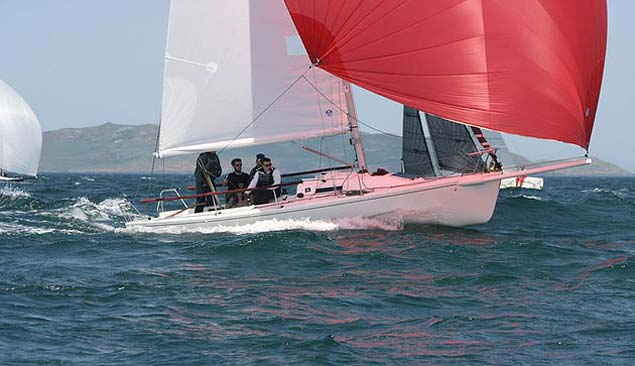 It was O'Grady's Jammy that took home the ISA gold medal
It was O'Grady's Jammy that took home the ISA gold medal
In the mixed Tonner class, it was Mike & Richie Evans' The Big Picture who took home the spoils. The boats in this fleet were clearly using this regatta as a warm-up for their season and keeping eyes on upcoming regattas such as Wave Regatta and the Quarter Ton Cup. Some gear failure and some non-appearances meant there was sometimes just a single boat going through the motions on the course.
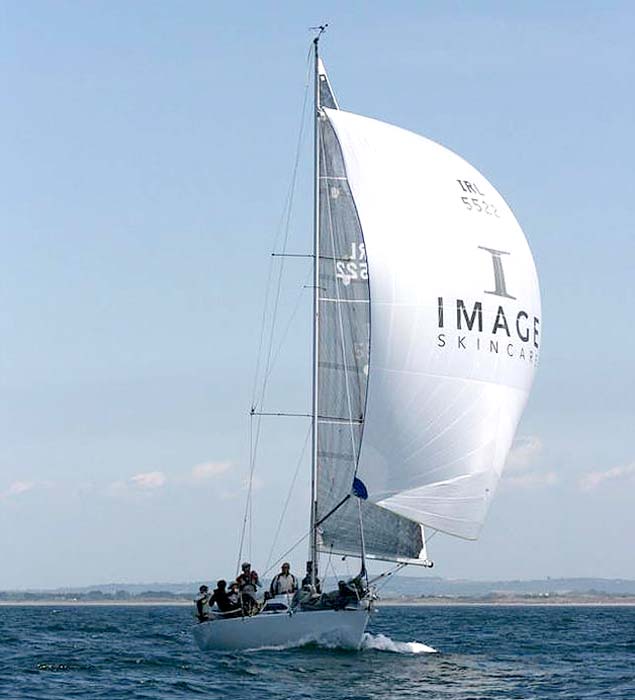 Mike & Richie Evans' Half Tonner, The Big Picture
Mike & Richie Evans' Half Tonner, The Big Picture
The overall Sportsboat Cup Champion and the winner of the Romaine Cagney Bowl was awarded to the winner of the 1720 Fleet as it was the most competitive fleet that was racing. The newly crowned European Champions of English/McDonald and their Atara crew deservedly add the 2018 Sportsboat Cup to their title. In having the championship wrapped up with a race to spare the Howth and Cork crew won more races than any other boat, were the most consistent and also posted the lowest discard in the fleet.
There were magic conditions for Day one of the 2018 Sportsboat Cup at Howth Yacht Club today. Sunshine and high teens temperature greeted the competitors for the midday start. With the wind whistling through the rigs on the marina rigs were being tightened and oilskins we donned. With a solid 18+ knots for the beat out to the racecourse, all the crews were trying to shake off the early season rust in prep for three races.
It turned out that the windiest part of the day was the sail out and pre-race warm up. The wind dropped to mid teens which meant the excited 1720 fleet were not quite flat out planning during the races. Still beautiful conditions. Race 1 was won by Atara (Ross McDonald/Aoife English) after a continuous battle with Royal Irish Yacht Club entry Optique (Colin Byrne) and Dutch Gold (Robert O'Leary). It was a premonition of the rest of the day. Although Antix (Fionn Lyden) made his presence felt after being in the main pack in race 1. Optique took race 2 in the lightest conditions of the day by leading around almost every mark while Antix strode ahead for a convincing win in race 3 laying down a marker at the end of the day as the wind rose.
"The top four are tightly bunched on the racecourse and overall"
Optique leads overall from Dutch Gold and Antix. The top four are tightly bunched on the racecourse and overall.
Three Jammy Wins
In the small J/80 fleet, Jammy (Dan O'Grady) dominated with three race wins. There was no quarter given between Mojo (Pat O'Neill) and Jam Jar (Philip Watson/Roger Cagney) with luffing matches galore downwind as they nipped and tucked each other exchanging second and third places.
Checkmate Gear Failure
The small tonner fleet became just two at the start of the day as Checkmate experienced some gear failure on the way to racing. Bit by bit the remaining boats cried off during the day with none competing in the final race. The Big Picture (Mike & Richie Evans) lead that fleet. These boats definitely have one eye on the upcoming Wave Regatta and the Quarter Ton Cup so are giving themselves and boats and good shakedown.
Racing continues tomorrow at midday with four races scheduled and a similar forecast.
Results here
#HYC - Ahead of the eagerly awaited Wave Regatta, Howth Yacht Club is getting ready to host the Sportsboat Cup 2018 this coming weekend — but it’s a contingent from Cork who are looking to retain the top prize for the Rebel County.
Defending champion T-Bone, the Durcan/O’Shea boat helmed by All Ireland Helmsman Champion Alex Barry, returns to the European Championship 1720 fleet where they will no doubt face a strong challenge from Antix — which has Fionn Lyden taking the place of Anthony O’Leary as skipper for this event.
Boats from Dun Laoghaire, Cork, Baltimore, Galway and Wales are set to converge on the Howth Peninsula for the 1720 title alongside a mixed fleet of Half and Quarter Tonners, among them Conor Fogerty’s vintage Silver Shamrock. (Download the sailing instructions below.)
As previously reported on Afloat.ie, this year’s Sportsboat Cup also incorporates the inaugural J/80 Irish National Championships, with Pat O’Neill’s Mojo having the jump on a small but experienced fleet with past Olympians, national champions and sailmakers involved.
The event runs back-to-back with Howth Yacht Club’s Wave Regatta on the weekend of 1-3 June, and its hoped many of the Sportsboat Cup competitors from the UK will stay on to race with the Irish fleet.
Andrew Algeo’s Juggernaut leads the J109’s into division one but faces stiff competition under IRC, as reported earlier today on Afloat.ie.
Inaugural J80 Champs Set for Howth Yacht Club's Sportsboat Cup; 100 Boats To Gather for One Design Event
15 boats are expected to enter the inaugural J80 National Championships when it features as part of the line-up of Howth Yacht Club's Sportsboat Cup next May.
The event will run over three days at the end of May, Friday the 25th thru Sunday the 27th. Download the Notice of Race document below.
Eight classes are invited to race with two classes choosing this regatta for their headline events for the 2018 season; as well as the Irish J80 Nationals the event will serve as the 1720 Europeans for a second time.
J24s Return to Worlds Venue
The resurgence of the Irish J24 fleet means they are expecting their best turnout in Howth since the the Worlds were here in 2013.
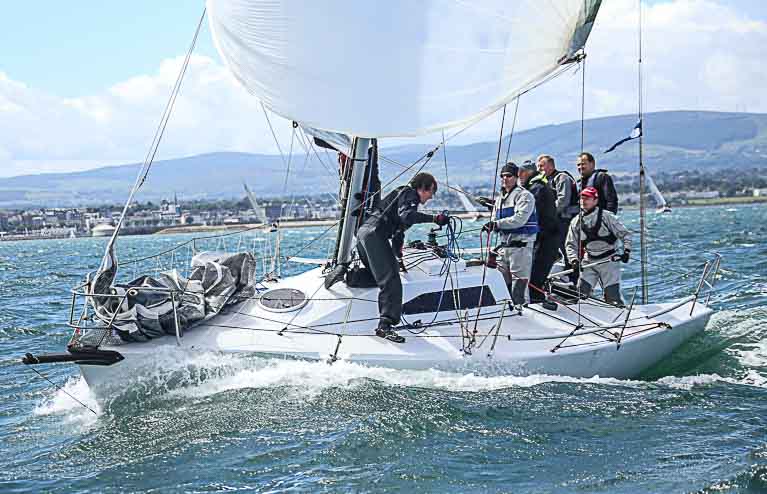 Half Ton racing will be part of the Sportsboat Cup Photo: Afloat.ie
Half Ton racing will be part of the Sportsboat Cup Photo: Afloat.ie
Half & Quarter Tonners
The Half and Quarter Tonners will be combining their resources to reach the critical mass for racing boats of their time and ilk without having to contend with some heavy cruisers as is their usual expectation under IRC.
SB20
SB20's are no stranger to Howth so with their fleet growing and becoming more active due to the Europeans being in Dun Laoghaire at the end of the summer expect to see crews use this opportunity to get plenty of race practice under their belt.
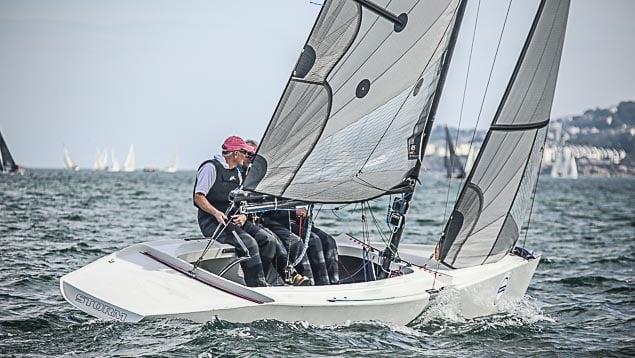 The Belfast Lough based RS Elite fleet are heading for Howth Photo: Afloat.ie
The Belfast Lough based RS Elite fleet are heading for Howth Photo: Afloat.ie
RS Elite
'With the demise of the Royal Alfred Yacht Club Baily Bowl One Design event in Dun Laoghaire, it is hoped that there will be strong showing from the North on their bank holiday weekend and they will travel south again with their RS Elites to a new venue in Howth, says event organiser Ross McDonald.
Flying Fifteen
Another class new to HYC will be the Flying Fifteens who's sizeable Dublin Bay Fleet won't have far to come to get involved at what HYC is promoting as 'Ireland's Premier Sportsboat Regatta'.
While not a new venue, it has been a long time since an International Dragon graced the north-side waters between Ireland's Eye and Lambay Island for some competitive racing, it will be the right weekend for them to rediscover what the racecourse and hospitality have to offer after a long absence.
To cater for up to eight classes racing and aiming to get in the full compliment of nine races planning is well underway for multiple race courses. The race management teams have excellently run all the windward-leward race, losing only one race over the previous events in challenging conditions. 'We are due for some good breeze this year to get the heart rate up with some downwind blasts', McDonald says.
There could be up to 100 boats racing and that will lead itself to plenty of action and a bustling atmosphere ashore. It is a great support that the two previous overall event winners - Flor O'Driscoll with Hard on Port, 2014 and Tom Durcan & Clive O'Shea with T-Bone, 2016 will be bringing their crews to compete again in 2018 hoping to regain and hold on to their title for another two years.
Enter online here to avail of the early bird discounted rate of €155.
'If your class wants to be involved get in touch and we will see how we can fit you in! We would love to have a mixed fleet class to bring together similar boats that don't have a big enough fleet to race one-design, McDonald says.
Howth may like to think of itself as the Dingle of the East Coast writes W M Nixon, but for the next three days from Friday June 27th, the Fingal peninsular port is taking aboard a distinct West Cork complexion with the Baltimore 1720 fleet setting the pace in Howth YC’s new Sportsboat Cup.
With a entry list pushing towards the 40 mark, more than a quarter of the total sportsboat fleet will be made up of the 1994–vintage Tony Castro-designed 1720s, the five-man boats which have found a new lease of life with a fleet centred around Baltimore Sailing Club.
Although several of the skippers are every bit as well known as active campaigners afloat from the Royal Cork YC at Crosshaven, the word is that when they sail forth in their 1720s, it’s the holiday place in Baltimore that they’re representing, and there’s no doubting the quality of the racing provided for the 1720s in the wide open spaces of Baltimore Harbour.
In one particular case there’s no doubt who is sailing for where either, with Robert O’Leary’s 1720 clearly named Jacob’s Bar making a point, though his father Anthony – a frontline sailor in 1720s for many seasons – stays firmly with his boat’s longtime name of Antix, now almost a generic term for O’Leary craft.
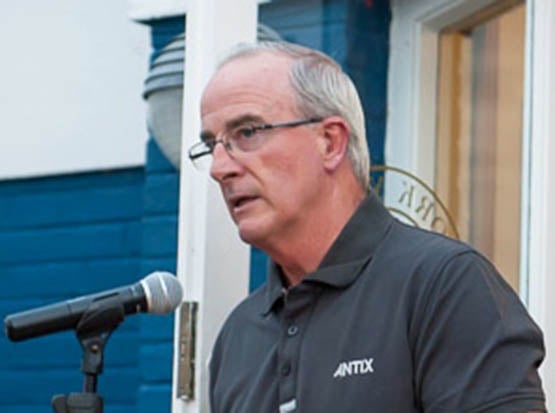
Anthony O’Leary will be racing his 1720 at Howth. Photo: Robert Bateman
However, although the golden oldies of the 1720 division will be making a fine show, in pure numerical standards it’s the SB20s which top the listings with a fleet of fourteen boats, though that will only get up to full strength as the Howth series morphs into the SB20 Eastern Championship. Names to watch include Olympian Peter Kennedy from the north, while Royal St George YC field a strong contingent including former stars in other classes such as Chris Arrowsmith and Marty Cuppage.
The Howth-based J/80s will be out in full strength, and though the chartering skippers are mainly Howth YC’s own, the net has been spread a bit wider to include Dara McDonagh of Courtown SC. And then the net has been spread a bit wider again with a ruling that, for this event, classic Quarter Tonners and Half Tonners will be seen as Honorary Sportsboats, with racing provided for them.
Sportsboat Cup Invitation Issued By Howth Yacht Club
With just six weeks to go until the second Howth Yacht Club Sportsboat Cup, enthusiasm is building. Seven fleets are signed up to race over three days at the end of May on two race courses. Richard Kissane and his teams are planning nine windward-leward races for Ireland’s premier Sportsboat Regatta.
In breaking from the mold, the quarter and half tonners are invited to race under IRC. A throwback to when they were the cutting edge racing classes, with spartan on-board facilities, they are now also included in the race schedule. The 'Tonners' are the only fleet not racing as one-design and they will be sharing the race track with the 1720s, SB20s, J80s, Sailfleet J80s, RS Elites and J24s. Notable entries already in are previous Afloat.ie Sailor of the Year Anthony O’Leary who will be racing in the 1720 class, while Howth's Laser Radial supremo Ewan McMahon (recently fifth at the Euros!) who has chartered a Sailfleet J80 and top performer of the Irish Fleet at last year’s SB20 Worlds - HYC's Shane Murphy.
All eight of the ISA Sailfleet J80s will be racing and they are available to public charter, with HYC members getting a special discount. At the recent Student Yachting Nationals there was considerable interest from the competing colleges in availing of this.
To complement the growing social offering, racing will begin each day at midday so there will be time to enjoy a leisurely breakfast and blow off the cobwebs each morning.
Howth Yacht Club’s renowned chef Jason Dunphy (ex Rolys, Conrad and more) will be serving up top notch food after sailing. With relaxed evening buffets on Friday and Saturday night planned before the music will really kick off. Tickets can be bought online when entering from next week.
The Sportsboat Cup is delighted to have Gosling’s Rum on board for the event as drinks sponsor. After racing on Saturday Gosling’s will be on site to promote their delicious Dark ‘n Stormy cocktail. Howth Yacht Club are the first club in Ireland to stock this delightful drink - a great accompaniment to Jason’s food if not immersed in the clubs extensive wine list.
Craneage and berthing is included in the entry fee for all boats competing. Any boats wishing to stay on for the Lambay Races the following Saturday and the ICRA Nationals are offered free berthing for the intervening weeks.
The early bird entry closes after the 1st May so get them in to get best value for your money.


























